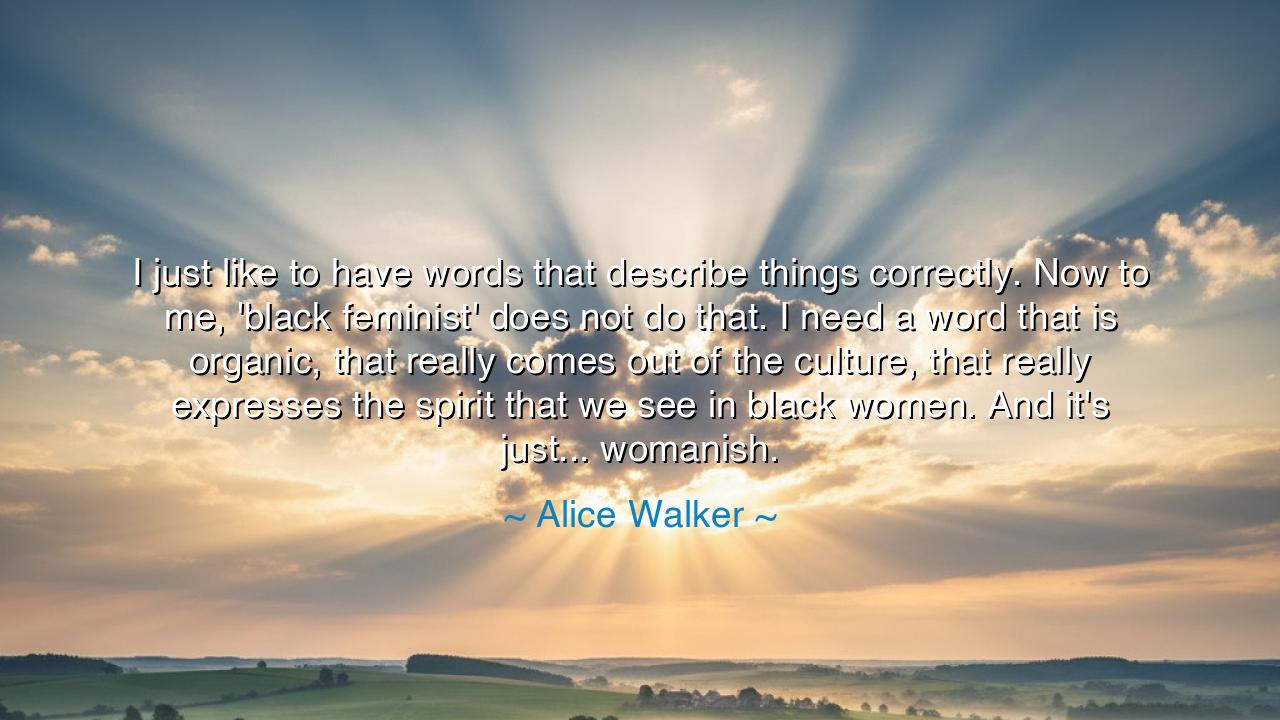
I just like to have words that describe things correctly. Now to
I just like to have words that describe things correctly. Now to me, 'black feminist' does not do that. I need a word that is organic, that really comes out of the culture, that really expresses the spirit that we see in black women. And it's just... womanish.






Hear the words of Alice Walker, seer and poet, who spoke with the wisdom of her people: “I just like to have words that describe things correctly. Now to me, ‘black feminist’ does not do that. I need a word that is organic, that really comes out of the culture, that really expresses the spirit that we see in black women. And it’s just… womanish.” In this utterance, she breathed life into a new vision, a language rooted not in borrowed terms but in the living soil of Black womanhood.
For womanist was the name she gave, a word drawn from the deep wells of African American culture. In the tradition of the elders, a child who acted grown was called “womanish”—bold, daring, unafraid. Walker claimed this word as a mantle, declaring that it carried the truth of Black women’s spirit more fully than the cold syllables of “black feminist.” Where feminism often centered the voices of white women, womanism rose from the heart of Black culture, embracing struggle, love, creativity, and survival as a unified whole.
Consider the story of Sojourner Truth, who in 1851 stood before a crowd and asked, “Ain’t I a woman?” In her cry was not only the demand for women’s rights, but the defiance of one who had known slavery, toil, and dismissal even within the women’s movement. Her speech revealed the truth Walker later named: that Black women’s experience is distinct, layered with burdens and strength unseen by those who spoke only of “feminism.” Truth embodied the very spirit of womanish—fierce, uncompromising, rooted in culture and reality.
The power of Walker’s re-naming is this: language is not neutral, but shapes the soul of movements. To choose a word that is organic, that rises from one’s own heritage, is to reclaim identity from those who would define it from outside. In “womanish,” there is humor, defiance, and honor—a declaration that Black women will not be diminished, nor neatly folded into terms that erase their uniqueness.
Therefore, let this wisdom endure: names matter, for they are vessels of spirit. Womanist is not merely a label, but a vision, one that insists upon wholeness and truth. Walker’s words remind us that to describe ourselves rightly is itself an act of liberation. For when a people name their own reality, they affirm their power, their culture, and their unbroken soul.






TNNguyen Thanh Nguyen
Alice Walker’s desire for a word that organically captures the spirit of black women is an intriguing challenge. Language shapes our understanding of identity, and 'womanish' seems like a term that could offer more depth than 'black feminist.' But is there danger in the exclusivity of 'womanish'? Could it alienate those who feel that label doesn’t fit their own experience of black womanhood? Or is it a way to reclaim and redefine a part of the culture?
TNTram Pham Thi Ngoc
Walker’s take on the term 'black feminist' being insufficient makes me reflect on how we define movements and identities. If language is meant to capture essence, can a term like 'black feminist' ever truly describe the unique experiences of black women? What makes 'womanish' so powerful, and could it gain more traction in understanding black womanhood? How often do labels fail to reflect lived experiences, and how can we create terms that resonate more authentically?
UGUser Google
I think Alice Walker’s point is a valid critique of the terms we often use to define complex identities. 'Black feminist' has become a widely accepted term, but can it ever capture the full breadth of the experiences of black women? Walker’s desire for a term that comes from the culture suggests that language is deeply intertwined with lived experiences. Is there a risk in trying to find the perfect word, though? Could it alienate others who might not identify with it?
VBDo Viet Bach
Walker's rejection of 'black feminist' in favor of something more organic and rooted in culture makes me question the way we define movements and identities. Why do we feel the need to categorize people into neat boxes? Can a single label ever truly represent the fullness of someone’s identity, especially for black women whose experiences are so unique? Is 'womanish' the word that can bridge that gap, or does it exclude certain facets of black womanhood?
TNcong tai Nguyen
I appreciate Walker’s desire to find a word that truly expresses the complexity of black womanhood. Her term, 'womanish,' suggests a deeper, more organic connection to the culture. But how do we navigate this desire for specific language in a world that often defaults to labels like 'black feminist'? Can we create new language that respects the nuances of identity, or do we risk overcomplicating something that already has a well-established framework?